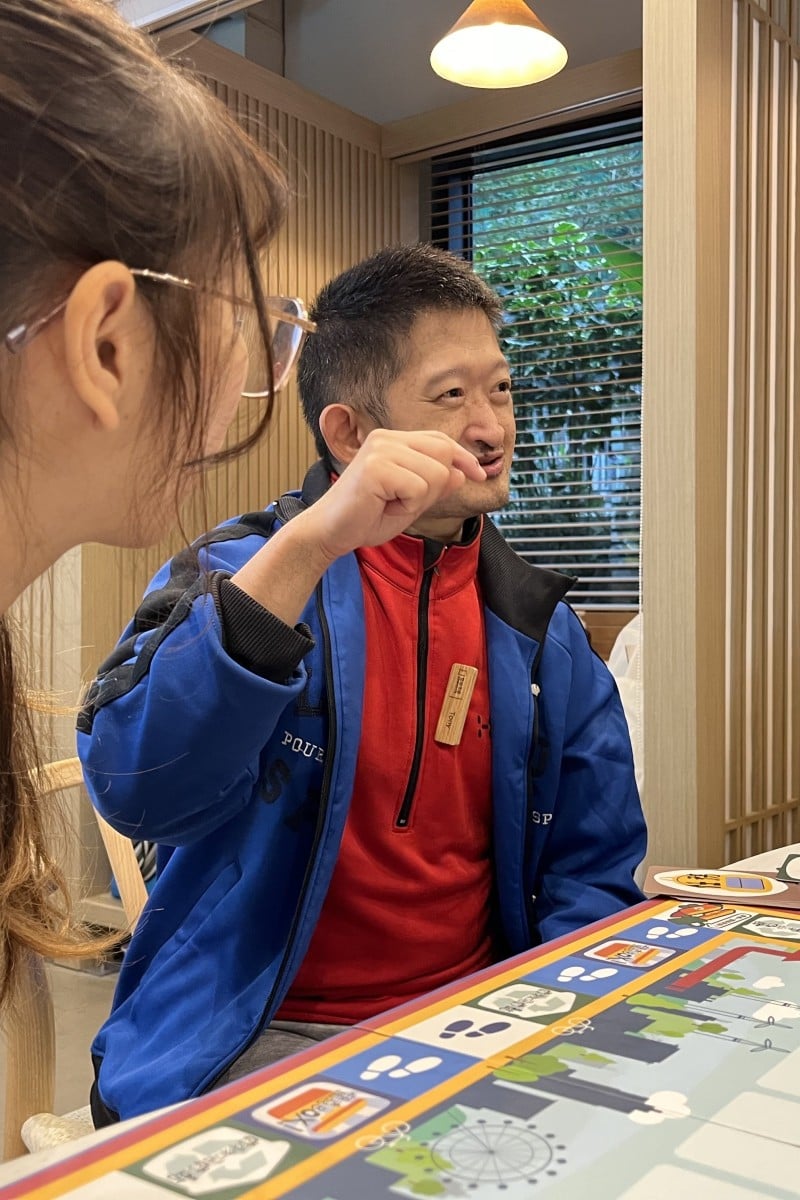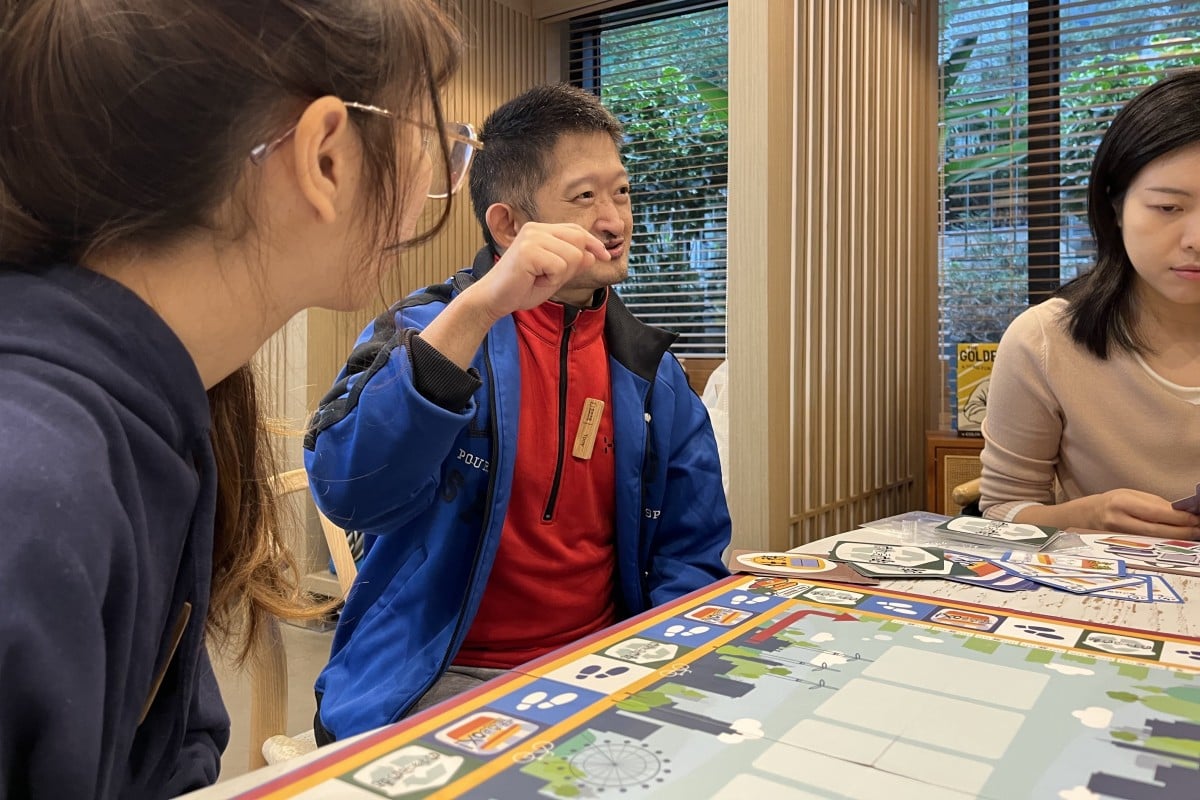
Social enterprise’s board game is Hong Kong’s first inclusive of special educational needs in teaching sustainability
- Kindnival has trained people with and without intellectual disabilities to be moderators for their board game workshops throughout the city
- Every week, Talking Points gives you a worksheet to practise your reading comprehension with exercises about the story we’ve written
 Tony Lo, who has mild intellectual disabilities, created the font design for Kindnival’s environmental board game. Photo: Handout
Tony Lo, who has mild intellectual disabilities, created the font design for Kindnival’s environmental board game. Photo: HandoutOn a Saturday afternoon in December, eager Hongkongers gathered at Yau Cafe in Sai Ying Pun for a board game workshop.
Six moderators – three of them with mild intellectual disabilities – guided small groups of players through completing “mission” cards to advance towards the finishing line. Each mission asks participants to answer a question or complete a task related to environmental awareness, from identifying what items are recyclable to understanding the impact of waste.
Natalie Yau Hiu-shuen and Claudia Lau Ching-yee are the masterminds behind this sustainability board game, which is the first in Hong Kong to be focused on educating individuals with mild intellectual disabilities and special educational needs (SEN).
“Environmental educational games are often complicated ... This made us wonder if individuals with intellectual disabilities or SEN students would be able to benefit from them,” said Yau, who is 26.
But the duo believed those with mental disabilities had the capacity to be learners and advocates, playing their part in protecting the environment.
In 2022, Yau and Lau founded the social enterprise, Kindnival, to promote eco-education through gamification. After receiving HK$100,000 from the Social Innovation and Entrepreneurship Development Fund, they partnered with cafes to organise board game workshops and trained youth – with and without mental disabilities – to lead the games.
Tetris finally meets its match in a 13-year-old gamer
They named the game “自煮日常”, which is related to giving “daily autonomy” to a community that often does not have control over many aspects of their lives.
“Those with SEN often have to follow certain rules, and those living in care homes often lack the freedom to decide what they can eat,” Yau noted.
“In this game, they can make their own decisions.”
Environmental education for all
Diana Lam, who is studying geography and education at Baptist University, shared that being one of the board game facilitators showed her how people with intellectual disabilities see the world.
“When the participants were asked a bonus question, even if they didn’t know the answer, they still attempted to make a guess. After my partner and I revealed the answer, participants began checking their personal belongings to see what kind of plastic they had,” she said. “The unintended learning is invaluable.”
Lam’s co-facilitator, Tony Lo, who has a mild mental disability, expressed his appreciation for the opportunity to take part in this project.
How to stay safe and pass the time during a typhoon
Not only was he trained to be a moderator, but he was also one of the two typography designers who created the unique font used in the board game.
Yau expressed the importance of creating avenues for mentally disabled people to pursue creative careers: “We hope that this training not only provides education but also gives them another opportunity to enter society and engage in meaningful work, with a salary that can meet their needs.”
It was through the experiences of her cousin that Yau recognised the career limitations faced by people with intellectual disabilities.
“I often hear about how difficult and labour-intensive their work is. As I sit in my own office, I wonder if they could have opportunities for such jobs as well,” the game creator said.
She shared an example of how people with mental disabilities were often trained in administrative work only to be relegated to manual labour, such as cleaning toilets.
“With such biases in society, I hope to let everyone know that we can offer them job opportunities and integrate them into mainstream society,” Yau said.
Developing the game
Despite the attention this eco-educational board game has now attracted, Yau learned early on that it is not easy to get people on board with sustainability.
In secondary school, she took part in a training programme where she promoted renting reusable lunchboxes from school for those buying takeaway. Unfortunately, this did not gain much traction.
Host of Instagram scavenger hunt game is bringing fun to Hong Kong youth
“The concepts of sustainability never really reached people’s hearts. So I began thinking about gamifying these ideas to make them more accessible,” she said.
Yau was working full-time in corporate sustainability when she and Lau – who met in university – started designing the board game in their free time.
After investing a year into the process, they created a simple yet thought-provoking game. Instead of using strategy-based play, they focused on decision-making.
“When we play the game, we have various decisions to make. We think about where to go to buy certain ingredients, and we incorporated concepts such as shared refrigerators and zero packaging,” she said, adding that they also used a palette that would be easy for colour-blind people to identify.
Kindnival has organised six training sessions for game facilitators, and 17 board game workshops for special schools, organisations employing disabled people, environmental educators and the public.
“During my time in secondary school, the way we were taught about the environment was very didactic, which often led students to think that it is dull,” she said.
“Our aim is to convey to everyone that environmental awareness is an integral part of our lives and something we can all contribute to collectively.”
To test your understanding of this story, download our printable worksheet or answer the questions in the quiz below.
